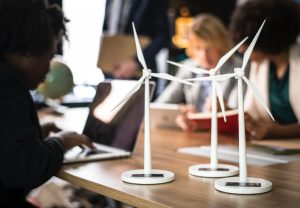How countries can switch fossil fuels to clean energy

Breaking News:
Tuesday, Jan 23, 2024

Climate change has been one of the most important topics of the century. One such reason is due to the extent of its reach in human society. Climate change does not only involve an increase in average temperatures, in addition, But It also results in changes to natural phenomena like extreme temperatures, wind, snowfall, rain, and a rise in sea level that directly and indirectly affect human life. Since these occurrences may cause enormous physical and psychological damage to a nation and its people, countries have to be permitted to prepare for adaptation at the national level. In particular, increases in localized intensive rain and intense rainfall events have resulted in a need for varied research regarding climate change and its consequences on metropolitan areas. Many researchers have examined the effects of climate change on urban irrigation infrastructure and municipal areas.
Existing urban irrigation systems are designed to deal with climate conditions in specific places. The ages of programs change and, in certain areas, can be quite obsolete (e.g., in many old city centres ). This means that existing urban drainage systems were designed for past climate conditions and may not be acceptable for current circumstances or ready to accommodate future changes, which points to the need to ‘upgrade’ the current sewer system, or constant maintenance works such as pipe relining.
The world seems to be underestimating the benefits that come with acting on climate change. Research shows that bold climate action can deliver around $26 trillion into the economic benefits through to 2030. This research was produced by the Global Commission and many different experts highlighted the proof points of the global shift to a low carbon economy. It identifies different ways to accelerate the action in different sectors of:

There is growing attention for clean energy. However, there is still around 80% that still account for fossil fuels global energy consumption and around 75% of greenhouse gas emissions. The fossil fuel energy system is coming in at a large cost. It is driving the economy into vulnerability which means businesses and countries are subject to volatile fuel prices and so many are relying on the costly energy imports. Oil, gas and coal are increasing for the human vulnerability also as the outdoor air pollution is due to the fossil fuel that is burning which is killing over 4.2 million a year around the world, as stated by the World Health Organisation. Renewables have the potential to get rid of these risks while they are providing different economic chances for communities and businesses to thrive in.
Here are a few ways that can help make the shift from fossil to clean energy systems:
Subsidies and other different supports for fossil fuel production and consumption have gone down but are still sitting at the 373 billion a year in a study conducted in 2015. Subsidy reform combines the carbon pricing and can generate the 70 national and even the subnational economies that have a price tag on carbon or are ready to consistently show that it does not slow down the economic growth. It shows a steady signal for businesses and consumers that it is time to shift their course. Even if carbon pricing is not yet in place the development finance institutions and businesses can implement a showdown carbon price in order to steer investments away from growing the already risky fossil fuel opportunities.
Innovative financing for better energy efficiency within buildings is already powering economic growth. However, we still need to stand up and expand our scope of the policies to get better investments to flow. Setting the standards for buildings and efficiency within boundaries, combined with innovative financing and leveraging private/public partnerships which have been able to demonstrate results all around the world.
Diversifying economies especially those that are rich in fossil fuels is no where near easy. Renewable energy companies are employing 10.3 million people in 2017 worldwide and seem to be so far the fastest-growing source for jobs in many different countries. There will be provisional impacts at the community and regional levels. Even the businesses that are standing out to gain phasing out the coal they will benefit from the government-led initiatives that are designed to bring in just a transition. China has stopped work on sum and delayed others on 151 coal power plants and has created a fund of 15 billion for retraining and reallocating plus early retirement of the estimated 6 million people that will be laid off due to the steel or coal sector over its capacity. So far, no plans as to which sector these people will be reallocated to but it would most likely be blue-collar; such as infrastructure construction or plumbing works such as clearing sewer blockage that occurs frequently.
We use cookies to ensure that we give you the best experience on our website. If you continue to use this site, we'll assume that you're ok with this.
Ok